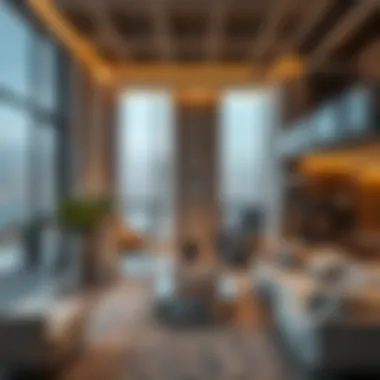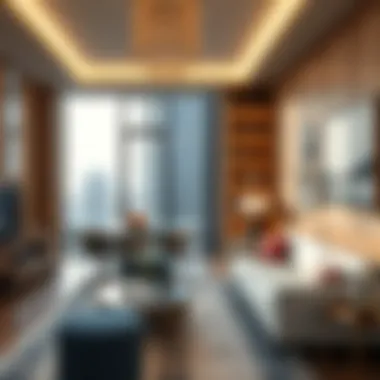Cost Analysis: Renting vs Buying an Apartment in Dubai


Intro
Navigating the real estate market in Dubai can feel like trying to find a needle in a haystack. Whether you’re a first-time renter, a seasoned investor, or even an expat looking to settle down, understanding the costs tied to acquiring or leasing an apartment is crucial. The city is a bustling hub, where the skyline is constantly evolving, and the real estate landscape mirrors that growth.
Given that Dubai is a melting pot of cultures and lifestyles, various aspects impact property prices. From the stunning views those high-rise apartments offer to the amenities within walking distance, costs can vary widely. This is not just about numbers; it’s about understanding what those numbers mean, especially for those involved in this market.
In this guide, we will delve into the specifics regarding both renting and buying an apartment in Dubai. We’ll address key considerations, current trends, and investment potentials. Let’s equip ourselves with the knowledge to balance budgets with aspirations, making informed choices as we navigate this vibrant property market.
Prelude to Dubai's Real Estate Market
The significance of understanding Dubai's real estate market cannot be understated, especially in an era where investment opportunities can ebb and flow as quickly as the tides. This vibrant metropolis has become a focal point for expatriates, investors, and real estate aficionados alike. Navigating this landscape not only requires an awareness of current trends and pricing but also a keen understanding of what makes Dubai a unique gem in the global property market.
Investors, whether seasoned or new, should grasp the different facets of this market, as it impacts both immediate and long-term financial strategies. Real estate in Dubai is not just about acquiring a property; it's about securing a place in an environment that promises potential growth and strong returns.
Overview of the Current Market
As of late 2023, Dubai's real estate market remains in a phase of transformation, with prices reflecting a steady increase following a slow recovery from past downturns. Unlike what one might expect in a typical city, where prices fluctuate based on seasonal trends, Dubai's market is influenced by a variety of factors, including international investment, the influx of expatriates, and government initiatives aimed at boosting property ownership.
Recent statistics indicate that rental prices have stabilized, with certain high-demand areas witnessing increases of up to 15% compared to previous years. This can be attributed to the city's resiliency and appeal, making it a hotspot for investors and renters alike. According to reports by tools like the Dubai Land Department, property transactions have surged, illustrating a rising inclination towards both renting and buying.
"In Dubai, the opportunities are nearly endless, but understanding the context is key to making intelligent moves."
Why Dubai is an Attractive Option
Dubai makes for a compelling choice due to several distinctive factors:
- Tax Environment: The absence of property tax and capital gains tax makes Dubai especially appealing for buyers considering long-term investment. This means a larger portion of profits remain in the investor's pocket, further incentivizing property purchases.
- Diverse Property Types: From luxurious high-rise apartments on the Palm Jumeirah to cozy studios in Jumeirah Village Circle, Dubai offers a plethora of choices tailored to various lifestyles and budgets. This diversity attracts a broad spectrum of residents.
- Cultural Melting Pot: The city's rich tapestry of cultures and lifestyles promotes an inclusive atmosphere, making it easier for expatriates to settle down. This is enhanced by the availability of worldwide amenities and services.
- Real Estate Regulations: The government has instituted measures to protect property investors. Initiatives like off-plan purchase guarantees and a heightened focus on transparency bolster investor confidence.
- Strategic Location: Alongside its real estate perks, Dubai's geographical position places it at the crossroads of Europe, Asia, and Africa, making it a prime hub for international travel and commerce.
In summary, recognizing these aspects of the Dubai real estate market will better equip potential renters and buyers, thus making informed decisions easier in such a competitive environment.
Factors Influencing Apartment Prices
Understanding the factors influencing apartment prices in Dubai is key for anyone looking to rent or buy. These elements not only shape the price tags we see but also affect the choices available, investment potential, and overall market dynamics. When considering whether to rent or buy, grasping these factors can help you make informed decisions and align your strategy with your financial goals.
Location and Accessibility
Location plays a pivotal role in determining the price of an apartment. The vicinity to key amenities such as schools, hospitals, shopping malls, and transportation links can elevate the desirability of a neighborhood. For instance, neighborhoods like Dubai Marina and Downtown Dubai, which boast close proximity to the beach and major attractions, often demand higher rents and sales prices compared to more remote areas.
Moreover, accessibility to public transport, notably the Dubai Metro, can heavily influence property values. A place well-served by transit options tends to attract a broader tenant pool or potential buyers, pushing prices upward.
"Location, location, location" is not just a saying; it's the backbone of any sound real estate investment.
A well-located apartment can appreciate in value at a much quicker rate, making it a smarter long-term investment.
Types of Apartments Available
The variety of apartment types can also sway prices significantly. From luxurious penthouses in Burj Khalifa to more modest one-bedroom units in Jumeirah Village Circle, the price spectrum is broad. High-end finishes, amenities like swimming pools, gyms, and security, attract higher rents and purchase prices.
Additionally, differing layouts and square footage can alter market perceptions. A two-bedroom apartment in a prestigious location will generally command a premium compared to a similar unit that lacks adequate facilities or aesthetic appeal.
Consider the following list when evaluating apartment types:
- Luxury apartments: High prices but significant amenities.
- Studio units: Affordable options popular among expatriates and young professionals.
- Family-sized units: Appeals to those with dependents, often slightly higher in price but suitable for longer-term living.
Market Demand and Supply


Finally, the fundamental principle of supply and demand plays a crucial role in shaping apartment prices. During times of economic growth, heightened demand for housing often leads to increased rental prices and property values. Conversely, in an oversaturated market, prices can drop, creating opportunities for buyers and renters alike.
Understanding how local and global economic conditions, including employment rates and foreign investment, influence market dynamics can help you pinpoint the right timing for your rental or purchase.
During a boom period, for instance, expect competitive pricing and quick turnover. In a downturn, however, it may be possible to negotiate better terms or find a gem at a lower price point.
Overall, evaluating these influencing factors allows investors and tenants to navigate the market with greater clarity and purpose. It’s about aligning your needs with the smart choices that these elements present.
Renting vs. Buying an Apartment
The decision to rent or buy an apartment is a significant crossroads for anyone looking to establish themselves in Dubai's dynamic real estate market. Understanding the costs associated with each path is essential for making an informed choice. Rental prices, purchase expenses, and additional fees can deeply impact financial well-being. Prospective tenants and buyers must weigh their options carefully, considering both immediate and long-term implications.
Understanding Rental Trends
Renting an apartment in Dubai presents a unique set of financial dynamics. In recent years, rental trends have evolved markedly. For instance, average rental costs have seen fluctuations, influenced by both the demand for housing and the economic climate. Popular areas like Dubai Marina and Downtown Dubai typically command higher rents due to their amenities and lifestyle offerings. Conversely, neighborhoods further away from the city center, such as Dubai Sports City or Jumeirah Village Circle, often boast more affordable options.
It’s wise to keep an eye on seasonal patterns as well—rental prices may dip during the summer months when the temperature soars, leading to a temporary decrease in demand for rental units. Other factors also play into rental decisions, including lease durations, which can range from short-term contracts to long-term agreements.
"The choice between renting and buying can change your financial trajectory. Renters must consider how much time and resources they can commit to their living situation."
Analyzing Buying Costs
When it comes to buying an apartment in Dubai, the cost implications stretch far beyond just the price tag on the property. There are various upfront payments and ongoing expenses that potential buyers need to take into account. The initial purchase price is just the tip of the iceberg. Costs typically include:
- Down payments, which can range from 10% to 25% depending on the loan structure and the buyer's nationality.
- Registration fees that hover around 4% of the property's value, payable to the Dubai Land Department at the time of purchase.
- Real estate agent fees, commonly about 2% of the overall price, which buyers should factor into their finances.
- Maintenance fees, which vary by building and can significantly affect the overall cost of ownership.
In addition to these costs, new homebuyers should also budget for potential renovations or decor updates that might enhance the value of the property or better align it with personal preferences. Understanding the complete financial layout can help buyers avoid unwelcome surprises in their budget.
Long-term Investment Considerations
Buying an apartment in Dubai is often seen as a long-term investment. As the city expands and matures, early buyers in developing areas may see property values appreciate significantly. However, prospective buyers should also recognize the risks associated with real estate investment. Economic shifts, changes in the job market, or new regulations could all pose challenges.
When analyzing the investment aspect, consider the following factors:
- Potential for property value increase: Certain neighborhoods may become more desirable over time, leading to increased values and equity for owners.
- Rental income generation: If buying an apartment in a popular area, owners may choose to rent out their property, providing a source of income.
- Market cycles: Keep an eye on real estate trends and economic indicators that can influence market conditions over time.
Cost Insights for Different Neighborhoods
Understanding the cost implications of renting and buying apartments in Dubai necessitates a close look at various neighborhoods. Each area presents its own unique financial landscape driven by factors like location, amenities, and community vibe. Grasping these cost insights not only helps potential renters or buyers make informed decisions but also guides investors in evaluating where to funnel their resources.
In the bustling metropolis of Dubai, certain districts demand significantly higher prices due to upscale lifestyle offerings, while others provide budget-friendly options that still maintain quality living standards. It's essential to dissect these variances for a clearer picture of the market.
Luxury Districts
When discussing luxury districts in Dubai, areas like Downtown Dubai, Dubai Marina, and Palm Jumeirah come to mind. Here, the price tags can be jaw-dropping, often reflecting not just the quality of the apartments but the extravagant lifestyle these neighborhoods promote.
- Downtown Dubai is home to iconic landmarks like the Burj Khalifa and offers lavish shopping and dining experiences, hence the high rental and buying costs. A one-bedroom apartment can easily exceed AED 120,000 annually.
- Dubai Marina, with its stunning waterfront views and vibrant social scene, often attracts expats and professionals, driving up demand and prices. Expect similar numbers when it comes to apartment rentals.
- On the other hand, Palm Jumeirah offers unique residences with premium amenities and private beach access, solidifying its position as one of the most coveted and expensive areas.
In these luxury districts, prospective buyers must consider both direct costs and the potential for a high return on investment if they choose to rent out their properties in the long term.
Affordable Areas
Contrasting with the luxury spots, Dubai boasts several neighborhoods that cater to more budget-conscious individuals. Areas such as Al Barsha, Deira, and Jumeirah Village Circle (JVC) offer more attractive pricing while still providing considerable benefits.
- Al Barsha is a well-rounded neighborhood that offers good schools, shopping opportunities, and more affordable rental prices, often under AED 70,000 for a one-bedroom apartment.
- Deira, with its rich history, cultural experiences, and proximity to the Dubai Creek, is a bustling area where many expats find affordable housing options starting at AED 50,000 for rental apartments.
- Jumeirah Village Circle has seen a surge in popularity, featuring both family homes and apartments. Its prices are lower in comparison to the more central areas, making it a pragmatic choice for many looking for a balance between cost and quality.
Understanding the affordability in these neighborhoods can provide renters and buyers with options that fit their budgets and needs without compromising on lifestyle.


Emerging Districts
In recent years, emerging districts like Dubai South, Dubai Studio City, and Tilal Al Ghaf have started to pique interest among investors and prospective residents. These areas usually come at a more accessible price point compared to their more established counterparts, making them worth considering.
- Dubai South is particularly appealing as it houses the Expo 2020 site and promises future development that could drastically uplift property values in the long-run. Buyers can find one-bedroom apartments below AED 60,000, which is enticing for newcomers to the market.
- Dubai Studio City, catering to those in the creative industries, offers a variety of living spaces and is designed with a modern lifestyle in mind. It presents competitive pricing that appeals to young professionals.
- Tilal Al Ghaf has positioned itself as a family-friendly community, integrated with parks and recreational facilities. This area is gradually unveiling more options for urban living at reasonable pricing, making it perfect for buyers who are looking into growing sectors.
Keeping an eye on these emerging neighborhoods can lead to advantageous investments before the market becomes saturated and prices skyrocket.
As you navigate through different neighborhoods in Dubai, remember that understanding the cost dynamics not only prepares you for current market challenges but could also provide financial returns down the road.
By dissecting these neighborhoods, potential tenants and investors can better align their choices with their financial capabilities and lifestyle aspirations. Each district offers a unique flavor, making the choice to rent or buy an apartment in Dubai an intriguing yet critical decision.
Regulatory Factors Impacting Costs
In the intricate world of Dubai's apartment market, regulatory factors can play a huge role in shaping the costs associated with both renting and purchasing properties. These regulations not only guide the operational framework within which real estate transactions occur but also have a direct impact on the pricing dynamics that potential investors and renters must navigate. For anyone looking to move within this bustling city, understanding the legal landscape is essential, as it can affect everything from rental agreements to ownership rights.
Government Policies on Rentals
The government of Dubai has instituted various policies aimed at regulating the rental market to make it fair and predictable. A fundamental regulation is the Dubai Rental Law, which sets forth the rules governing rental increases. According to this law, landlords are restricted on how much they can raise rent each year, typically limited to a certain percentage unless special provisions are met. This means that tenants can breathe a little easier, knowing their rental costs won’t skyrocket without warning.
Additionally, tenants have a layer of protection since wrongfully evicting a tenant is generally prohibited unless there are significant grounds, like non-payment of rent or property misuse. This creates a more stable environment for renters, though it’s important for them to do their homework regarding their rights and responsibilities. Knowing the rental law can be the difference between enjoying a cozy living space and dealing with a landlord who tries to pull a fast one.
Ownership Laws for Expatriates
For expatriates, the ownership laws in Dubai are notably welcoming compared to many other parts of the world. Foreigners can own property in designated areas, known as freehold areas, which include popular spots like Dubai Marina and Downtown Dubai. This is a significant consideration for anyone contemplating investing in real estate in the city. However, it’s worth pointing out that these ownership rights don’t come without some strings attached.
Primarily, there are limitations placed on the types of properties expatriates can purchase, often requiring adherence to certain regulatory frameworks. For example, expatriates might need to ensure that their investment aligns with local laws which often entail hefty down payments alongside the applicable registration fees. Prospective buyers need to be aware of these stipulations to avoid any nasty surprises down the road.
Recent Legal Developments
Keeping up with legal developments is critical because the government continuously revises laws to adapt to market conditions. In recent years, there have been initiatives to bolster consumer protections in real estate transactions, including updates to rental contracts to ensure that they are clear and standardized, thus preventing disputes between parties.
Moreover, the introduction of the Real Estate Regulatory Agency (RERA) has been a game-changer, as it acts as the governing body overseeing transactions and protecting the interests of both landlords and tenants. With ongoing discussions about enhancing these protections, it’s clear that the legal landscape in Dubai continues to evolve, impacting the costs associated with both renting and buying apartments.
The landscape of regulatory factors requires constant attention; laws are ever-changing, and staying informed is a necessity.
In summary, understanding the regulatory framework in Dubai is not just for real estate professionals but also for potential renters and buyers. Each legal nuance can significantly influence the costs you will incur, making awareness an essential component of any property investment strategy.
Financing Options for Buyers
When considering buying an apartment in Dubai, understanding financing options is crucial. Many prospective buyers may find the landscape of mortgages and loans a bit overwhelming. It’s not just about picking the right apartment; it’s also about figuring out how to pay for it.
The financial mechanisms used to buy property in Dubai have undergone significant evolution. Notably, there's a blossoming range of options available, facilitating ease of access for both locals and expatriates. In essence, having a grasp of these options can shape one’s overall buying experience and significantly impact long-term financial health.
Understanding Mortgages in Dubai
A mortgage is essentially a loan secured against the property being purchased. In Dubai, various local and international banks offer different mortgage products. Understanding the ins and outs of these options can save buyers a heap of cash in the long run.
- Types of Mortgages: The common types include fixed-rate mortgages, which keep your interest rate steady over the term, and adjustable-rate mortgages, where rates can shift based on market conditions.
- Eligibility Criteria: Expatriates typically have different eligibility criteria compared to UAE nationals, mainly revolving around income requirements and residency status. This disparity is essential for potential buyers to keep in mind, as it could affect their financing route.
- Fixed-rate mortgages can be excellent if you prefer consistency in your monthly payment.
- Conversely, an adjustable-rate mortgage might start at a lower rate but can increase over time, which requires careful financial planning.
Down Payment Requirements
One of the most pivotal aspects of buying a property in Dubai is the down payment. This upfront cost varies widely based on numerous factors like property value and buyer nationality.


- Standard Down Payment Rates: Generally, expats are required to make a down payment of at least 20% of the property value if it’s an apartment. Meanwhile, for UAE nationals, this could be as low as 15%.
- Implications on Cash Flow: Buyers should factor in the down payment when planning their finances. Paying a higher percentage might reduce overall loan amounts but can strain initial cash flow significantly.
- Consider Savings: Before diving into the mortgage process, it might be sensible for potential buyers to bolster their savings. Saving beyond the down payment can ease the financial burden and ensure other costs related to moving, maintenance, and insurance are covered.
The Role of Local Banks
Local banks play a significant role in the buying process in Dubai. They can be your best friend—advisors on where to put your cash, how to secure loans, and even how to negotiate terms.
- Support and Guidance: Many banks provide financial consultancy services to help prospective buyers navigate through mortgage options. This includes detailing the costs involved, from origination fees to closing costs.
- Interest Rates Variances: Different banks offer varying interest rates based on their evaluations and current market trends, so it can be worth your while to shop around. This is where some savvy negotiation skills can come in handy.
- Online Banking Facilities: A growing number of banks in Dubai are embracing technology, meaning applicants can now manage their mortgage applications online. This convenience helps track the application status, making the process less daunting.
Deciding on the right financing options can either make or break your buying experience in Dubai’s real estate market. Take the time to explore all the options, as this could be one of the smartest financial decisions you'll ever make.
Future Trends in Dubai's Apartment Market
Understanding the future trends in Dubai's apartment market is crucial for anyone considering investing in this dynamic locale. It's not just about what’s happening today; projections about tomorrow can help investors, renters, and home buyers make informed decisions. As Dubai continues to grow and attract expatriates from all walks of life, keeping an eye on emerging patterns can give you a leg up on the competition.
Projected Price Movements
The trajectory of apartment prices in Dubai is of significant interest to both renters and buyers. Experts predict fluctuations driven by a mix of factors including economic growth, geopolitical stability, and shifts in demand. For instance, while some reports indicate that prices may stabilize following explosive growth in previous years, others suggest that certain districts will experience upward price pressure due to increased demand for luxury and high-end properties.
- Increase in high-end apartments: Areas like Dubai Marina and Downtown Dubai may see price surges due to their central locations and amenities.
- Rent control discussions: Authorities examining policies to stabilize rental prices could have a notable impact, especially in popular expatriate areas.
- Market corrections: Potential for price corrections exists; investors should remain vigilant about economic indicators that may signal when to buy or wait, especially if prices inflate unrealistically.
As you can see, it's a mixed bag of expectations, and those who pay attention can potentially save a penny or two.
Impact of Economic Changes
Economics plays a significant role in shaping property prices. Consider the ripple effect that fluctuations in the UAE's economy can have on the real estate market. A robust economy fosters growth, which in turn drives housing demand. Conversely, economic downturns may lead to reduced consumer confidence, thus tempering demand for both rentals and purchases.
In recent years, Dubai has pivoted towards diversifying its economy beyond oil revenues. With growth in sectors like tourism and technology, there’s an ongoing momentum that potential buyers and renters must take note of:
- Tourism Revival: As global travel rebounds, increased tourism translates into high occupancy rates in rental apartments, reinforcing price stability.
- Infrastructure Investments: Ongoing and planned investments in public transport and amenities further bolster desirability of certain neighborhoods, influencing real estate premiums.
- Global Economic Trends: The broader economic outlook—be it in Europe, Asia, or North America—will affect investor confidence in Dubai’s market.
These economic indicators are not mere numbers; they represent opportunities for those who are keen on maximizing their real estate strategies.
Shifts in Consumer Preferences
Consumer preferences in the Dubai apartment market are evolving, greatly influenced by the changing needs of residents and the broader demographic. Understanding these shifts can equip investors and renters with insights into where to focus their attention.
- Sustainable Living: More buyers are looking for eco-friendly buildings with sustainable features. This trend indicates a shift in what is deemed desirable in the property market.
- Remote Work: The pandemic has catalyzed a long-term preference for apartments that offer more space or coworking amenities, influencing demand in different areas.
- Community-Centric Developments: Residents show a growing preference for mixed-use developments that promote community living, impacting the designs and pricing of future projects.
The consumption trends are redefining what makes a property appealing, thus steering market demand in new directions.
"Staying ahead of consumer preferences ensures that investments remain viable and profitable."
Epilogue
Understanding the cost implications of renting versus buying an apartment in Dubai is not only crucial for potential residents but also for investors and real estate professionals. The market here offers a unique blend of opportunities and challenges that require thorough examination. Evaluating the financial aspects of both renting and buying helps to clarify which option suits individual needs and long-term goals.
Summary of Findings
In this article, we explored the various factors affecting the costs of apartments in Dubai, including location, types of apartments, and market dynamics.
- Location plays a pivotal role; premium areas like Dubai Marina and Downtown Abu Dhabi naturally command higher prices, while emerging neighborhoods offer more budget-friendly options.
- Type of apartments also influences costs, with luxury units significantly pricier compared to standard offerings.
- The balance between market supply and demand fluctuates, impacting both rental rates and purchase prices.Knowing when and where to enter the market can make all the difference.
Ultimately, renting may seem to have lower immediate costs, but buying potentially offers better long-term return on investment, particularly in a buoyant market like Dubai’s.
Final Thoughts on Market Viability
The viability of engaging with Dubai’s real estate market hinges upon one’s personal situation, financial health, and future plans. While current trends indicate a robust demand for quality housing, prospective renters and buyers need to assess their options holistically.
Factors such as evolving government regulations, the influence of global economic conditions, and shifts in consumer preferences are also critical in making sound decisions. A strategic approach would be to stay informed on these trends, as well as leveraging local real estate expertise, ensuring you make choices that align with your financial landscape. Going forward, keeping an eye on emerging areas can yield better investment rewards, whereas renting could provide flexibility for newcomers navigating this vibrant market.
"In a city where the skyline is ever-changing, understanding the cost implications may just be as important as where you find your new home."
By engaging actively with advice and trends from local sources like the Dubai Land Department and real estate platforms, one can truly grasp the evolving dynamics and make informed choices in this unique property market. For comprehensive resources, visit Wikipedia - Property in Dubai or insights on pricing and trends from Google.



